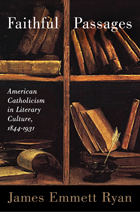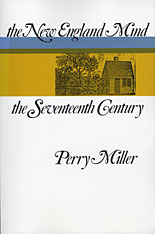3 books about Christian literature, American

Faithful Passages
American Catholicism in Literary Culture, 1844–1931
James Emmett Ryan
University of Wisconsin Press, 2013
Roman Catholic writers in colonial America played only a minority role in debates about religion, politics, morality, national identity, and literary culture. However, the commercial print revolution of the nineteenth century, combined with the arrival of many European Catholic immigrants, provided a vibrant evangelical nexus in which Roman Catholic print discourse would thrive among a tightly knit circle of American writers and readers. James Emmett Ryan’s pathbreaking study follows the careers of important nineteenth-century religionists including Orestes Brownson, Isaac Hecker, Anna Hanson Dorsey, and Cardinal James Gibbons, tracing the distinctive literature that they created during the years that non-Catholic writers like Herman Melville and Emily Dickinson were producing iconic works of American literature.
Faithful Passages also reveals new dimensions in American religious literary culture by moving beyond the antebellum period to consider how the first important cohort of Catholic writers shaped their message for subsequent generations of readers in the late nineteenth and early twentieth centuries. Perhaps most strikingly, Ryan shows that by the early twentieth century, Roman Catholic themes and traditions in American literature would be advanced in complex ways by mainstream, non-Catholic modernist writers like Kate Chopin and Willa Cather.
Catholic literary culture in the United States took shape in a myriad of ways and at the hands of diverse participants. The process by which Roman Catholic ideas, themes, and moralities were shared and adapted by writers with highly differentiated beliefs, Ryan contends, illuminates a surprising fluidity of religious commitment and expression in early U.S. literary culture.
Faithful Passages also reveals new dimensions in American religious literary culture by moving beyond the antebellum period to consider how the first important cohort of Catholic writers shaped their message for subsequent generations of readers in the late nineteenth and early twentieth centuries. Perhaps most strikingly, Ryan shows that by the early twentieth century, Roman Catholic themes and traditions in American literature would be advanced in complex ways by mainstream, non-Catholic modernist writers like Kate Chopin and Willa Cather.
Catholic literary culture in the United States took shape in a myriad of ways and at the hands of diverse participants. The process by which Roman Catholic ideas, themes, and moralities were shared and adapted by writers with highly differentiated beliefs, Ryan contends, illuminates a surprising fluidity of religious commitment and expression in early U.S. literary culture.
[more]

The New England Mind
The Seventeenth Century
Perry Miller
Harvard University Press, 1982
In The New England Mind: The Seventeenth Century, as well as successor The New England Mind: From Colony to Province, Perry Miller asserts a single intellectual history for America that could be traced to the Puritan belief system.
[more]

The Tutor'd Mind
Indian Missionary-Writers in Antebellum America
Bernd C. Peyer
University of Massachusetts Press, 1997
Part historical narrative, part textual analysis, this book traces the development of American Indian literature from the seventeenth century to the eve of the Civil War. Bernd C. Peyer focuses on the lives and writings of four prominent Indian missionaries—Samson Occom of the Mohegans, William Apess of the Pequots, Elias Boudinot of the Cherokees, and George Copway of the Ojibwa—each of whom struggled to negotiate a secure place between the imperatives of colonial rule and the rights of native peoples.
In the view of the English colonists and their descendants, Indian converts to Christianity were expected to repudiate native traditions and affirm the superiority of European civilization, to serve as role models, and to spread the gospel far into the wilderness. Yet as Bernd C. Peyer shows, Indian missionaries did not always fulfill the expectations of those who trained them. Once the Indians recognized that conversion alone did not guarantee protection from discrimination, they devised a variety of strategies, theological as well as practical, to resist assimilation into the dominant white culture. Making effective use of their literacy and education, they called attention to the discrepancy between the Protestant ideals they had been taught and the Anglo-American practices to which native people were subjected.
By uncovering this subtext of dissent and resistance, Peyer at once alters and enriches our understanding of the evolution of the American Indian literary tradition.
In the view of the English colonists and their descendants, Indian converts to Christianity were expected to repudiate native traditions and affirm the superiority of European civilization, to serve as role models, and to spread the gospel far into the wilderness. Yet as Bernd C. Peyer shows, Indian missionaries did not always fulfill the expectations of those who trained them. Once the Indians recognized that conversion alone did not guarantee protection from discrimination, they devised a variety of strategies, theological as well as practical, to resist assimilation into the dominant white culture. Making effective use of their literacy and education, they called attention to the discrepancy between the Protestant ideals they had been taught and the Anglo-American practices to which native people were subjected.
By uncovering this subtext of dissent and resistance, Peyer at once alters and enriches our understanding of the evolution of the American Indian literary tradition.
[more]
READERS
Browse our collection.
PUBLISHERS
See BiblioVault's publisher services.
STUDENT SERVICES
Files for college accessibility offices.
UChicago Accessibility Resources
home | accessibility | search | about | contact us
BiblioVault ® 2001 - 2024
The University of Chicago Press









